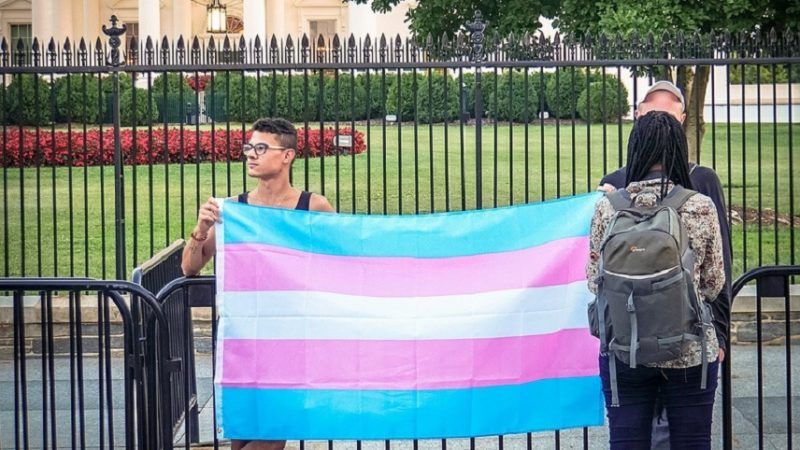The Transgender Debate Is Overblown
Transgender individuals serve in the military, and will likely continue; Trump's directive will be overturned in court or reversed by a future administration.

In 2003, Massachusetts became the first state to legalize gay marriage. Connecticut followed five years later, and then the dam crumbled. By 2013, twelve states and the District of Columbia allowed same-sex unions. Two years later, the Supreme Court made them legal throughout the country.
The year after that, Time magazine reported: "The U.S. divorce rate dropped for the third year in a row, reaching its lowest point in nearly 40 years." Moreover: "Marriage rates, on the other hand, increased last year (to) the highest number of marriages since 2009, which suggests that marriage rates may be stabilizing after decades of decline."
This is not exactly what gay-marriage opponents had predicted.
To the contrary, they had predicted utter catastrophe: the degradation—and perhaps the complete destruction—of "the institution of" marriage.
"Weakening marital norms will hurt children and spouses, especially the poorest," went one common argument. Let same-sex couples wed, opponents warned, and pretty soon people would be marrying their horses, pedophilia would be encouraged, and polygamy would be rampant.
"The emerging elite consensus in favor of same-sex marriage," contended National Review in 2010, "has an element of self-delusion about it. It denies that same-sex marriage would work a radical change in American law or society, insisting to the contrary that within a few years of its triumph everyone will wonder what all the fuss was about." NR conceded the latter theoretical possibility, but concluded: "If our understanding of marriage changes in this way, so much the worse for the future."
Well. The future is here now. And marriage-wise, things look pretty good.
The same story played out regarding the repeal of the "Don't Ask, Don't Tell" (DADT) policy on gays in the military.
Letting gays serve openly would inflict a "great cost," warned Sen. John McCain. Others predicted that openly gay service members would destroy "unit cohesion" and wreak havoc on "good order and discipline" to the point that it would "cost … lives." More than 1,000 retired officers wrote a public letter to President Obama predicting that the repeal of DADT would "break the all-volunteer force."
"Our finest, most effective non-commissioned officers will leave the service at the end of their current enlistment," fretted Oliver North, "and there won't be anyone around to train the next batch of replacements—assuming they can be recruited." Others predicted such great losses of personnel that the military would have to bring back the draft.
DADT was repealed nevertheless. Several years later, still no sign of the draft.
Racial integration of the armed forces? That, too, was supposed to lead to ruination. "The army is not a sociological laboratory," declared Col. Eugene Householder. Social experiments "are a danger to efficiency, discipline, and morale and would result in ultimate defeat."
"It is a well-known fact," said Army Secretary Kenneth Royall, "that close personal association with Negroes is distasteful to a large percentage of Southern whites."
Anybody who thinks a racially integrated military is a problem today, please raise your hand.
All of which is to suggest that the current contretemps over transgender people serving in the military is probably overblown.
Last week, the White House finally transformed the tweet-spurts from President Trump's id into an actual policy. It boils down to banning new transgender recruits, and deciding what to do with current personnel on a case-by-case basis.
That's an improvement over the president's earlier position, which could have led to the wholesale discharge of people serving their country with dedication and honor.
But it's still a step backward.
Which is not to say the previous policy was perfect.
Did the Obama administration act too precipitously when it ordered the services to start recruiting transgender individuals by July of this year? Yes.
Would accepting transgender recruits impose costs on a strained military budget? No doubt—although the total will amount to less than a rounding error in Pentagon financing: $20 million a year at most, which is less than one-fourth what the military spends on Viagra.
Does the issue raise difficult questions about barracks life, long-term deployment, and other facets of service unique to the armed forces? It certainly does—and military leaders need time to think them through with deliberation and care.
Nevertheless, transgender individuals serve in the military now. And they almost certainly will continue to do so—either because Trump's directive will be overturned in court, or because it will be reversed by a future administration.
To some, at present, this seems like a radical change in American law or society. But within a few years everyone will wonder what all the fuss was about.
This column originally appeared at the Richmon Times-Dispatch.
